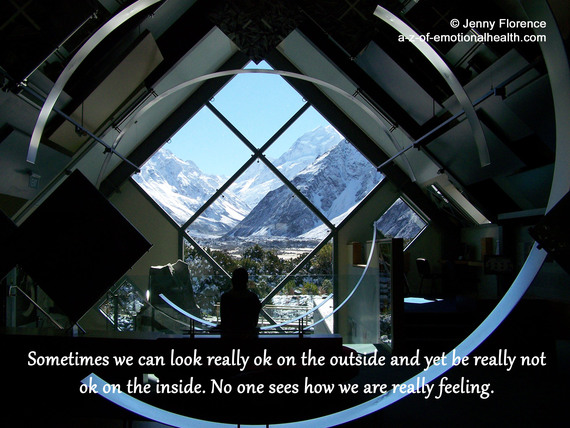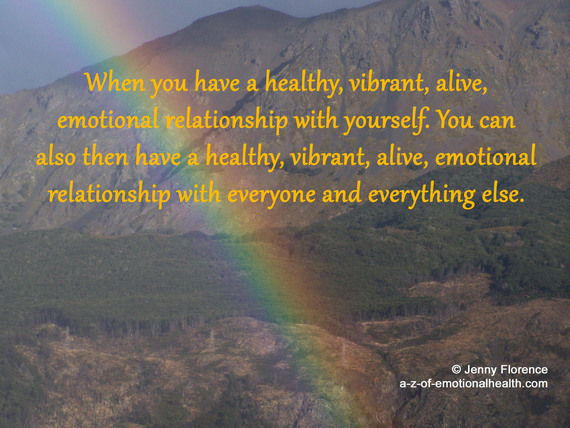
You know many people never really think about their emotional health and well-being until they hit a point of crisis or breakdown.
In reality our emotions are our navigational system, and yet many people have not been well equipped to relate to their emotional experiences. They struggle to understand the way that they are feeling and lack an emotional language. This leaves them uncertain and afraid of any intense emotional experiences, sometimes even the good ones. But the reality is that everything that we feel is vital to us and of value. We have this extraordinary navigational system and it's made up of all of our emotions. Every single emotion that we have, we need and we would be incomplete without the full range.
Sometimes the most difficult times in our lives actually create a kind of doorway to a greater level of awareness, a place in time when we shift to greater level of consciousness and understanding.
Whatever is going on, I guarantee that your emotions are informing you and whatever your feelings are telling you, whether it's comfortable or uncomfortable, whether it's easy or uneasy, it's good information. Our emotions connect us to the deepest parts of ourselves. They are invisible and yet powerful beyond measure. Sometimes we can look really OK on the outside and yet be really not ok on the inside. No one sees how we are really feeling.
Historically, we live in a culture that reinforces the perception that any uncomfortable feelings are wrong, or bad. If you feel unease, then you have some kind of disease, some kind of illness.
If you are stressed and experiencing intense, difficult and challenging emotions and you seek medical help it is highly likely that the very first line of support that you will be offered will be some form of medication. Sometimes this is valuable; however, this is not always the case. Whilst I am not actually anti-medication, what I am longing to see is an appropriate and thoughtful system of diagnosis, with an appropriate level of interest and inquiry.
It is essential that we develop a culture of what I call "non-judgmental inquiry," an emotionally aware culture of interest and inquiry, without judgement and criticism, with a desire to look deeper. Without this we are fueling a climate which reinforces the perception that any form of emotional difficulty is a bad thing, indeed something to be frightened of.
To my mind the solution is not to take a pill so that you can continue to be stressed, but do it better; or to take a pill to enable you to develop a tolerance to something that isn't actually ok. When this happens our navigational system is being shut down.
Human beings are 100 percent relational. We live in a continual state of relationship, both with ourselves and with everything around us. We are in a continual relational flow both internally and externally. Our emotions give voice to our deepest inner needs, they let us know when things are going well for us, and in no uncertain terms, they let us know when they are not. So many of us have never learned any kind of emotional language or developed an ability to really listen to ourselves. We have this extraordinary navigational tool and yet we haven't learned to use it, let alone value the full range of our emotional experiences.
So many of our emotions get labelled as bad or negative and yet this good/bad, positive/negative kind of definition is a very narrow description, and one that doesn't recognize how important all of our feelings actually are. I'd like to reclassify these headings with a new definition. I'd like us to consider our emotions as falling into, either the easy comfortable camp, full of joyful happy relaxed emotional experiences, or the uneasy uncomfortable camp, full of the more challenging and difficult experiences.
None of the above states of being are bad. If you're feeling something in the uneasy, uncomfortable camp, this is informing you, it's telling you that something is going on and we need to learn to listen to this and to use this valuable information.
Our emotions are the vehicle that enables us to be fully relational, our emotions are continually informing us and they give us the information we need to navigate our lives. This emotional information then generates highly charged emotional energy. This energy gives us the drive and the power to fuel thought into action. The intensity of our emotional experience can literally rocket from 0 to 1,000 miles an hour in seconds. If we are unable to listen to ourselves then we are unable to take charge of these highly charged actions. They become re-actions, rather than reflective choices.
Learning an emotional language is absolutely at the core of emotional health and emotional well-being. It's also at the core of any healthy cultural and social system of living. We cannot possibly generate external relationships that are responsive and healthy until we have a responsive and healthy relationship with ourselves.
When you have a healthy, vibrant, alive, emotional relationship with yourself. You can also then have a healthy, vibrant, alive, emotional relationship with everyone and everything else.

